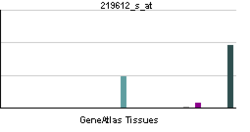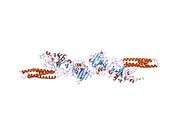Fibrinogen gamma chain
| FGG
|
|---|
 |
| Available structures |
|---|
| PDB | Ortholog search: PDBe RCSB |
|---|
| List of PDB id codes |
|
1DUG, 1FIB, 1FIC, 1FID, 1FZA, 1FZB, 1FZC, 1FZE, 1FZF, 1FZG, 1LT9, 1LTJ, 1N86, 1N8E, 1RE3, 1RE4, 1RF0, 1RF1, 2A45, 2FFD, 2FIB, 2H43, 2HLO, 2HOD, 2HPC, 2HWL, 2OYH, 2OYI, 2Q9I, 2VDO, 2VDP, 2VDQ, 2VDR, 2VR3, 2XNX, 2XNY, 2Y7L, 2Z4E, 3BVH, 3E1I, 3FIB, 3GHG, 3H32, 3HUS, 4B60
| | |
| Identifiers |
|---|
| Aliases |
FGG |
|---|
| External IDs |
MGI: 95526 HomoloGene: 429 GeneCards: FGG
|
|---|
|
|
| RNA expression pattern |
|---|
 |
| More reference expression data
|
| Orthologs |
|---|
| Species |
Human |
Mouse |
|---|
| Entrez |
|
|
|---|
| Ensembl |
|
|
|---|
| UniProt |
|
|
|---|
| RefSeq (mRNA) |
| |
|---|
| RefSeq (protein) |
| |
|---|
| Location (UCSC) |
Chr 4: 154.6 – 154.61 Mb |
Chr 3: 83.01 – 83.02 Mb |
|---|
| PubMed search |
[1] |
[2]
|
|---|
| Wikidata |
Fibrinogen gamma chain, also known as FGG, is a human gene found on Chromosome 4.
The protein encoded by this gene is the gamma component of fibrinogen, a blood-borne glycoprotein composed of three pairs of nonidentical polypeptide chains. Following vascular injury, fibrinogen is cleaved by thrombin to form fibrin which is the most abundant component of blood clots. In addition, various cleavage products of fibrinogen and fibrin regulate cell adhesion and spreading, display vasoconstrictor and chemotactic activities, and are mitogens for several cell types. Mutations in this gene lead to several disorders, including dysfibrinogenemia, hypofibrinogenemia and thrombophilia.[3] Alternative splicing of the mRNA chain results in two transcript variants; the common γA chain and the alternatively spliced γ' chain. Approximately 10% of the total plasma fibrinogen consists of γA/γ' fibrinogen, with <1% consisting of γ'/γ' fibrinogen. Increased and decreased levels of γA/γ' fibrinogen have been associated with CAD and DVT respectively.
References
Further reading
PDB gallery |
|---|
|
| 1fib: RECOMBINANT HUMAN GAMMA-FIBRINOGEN CARBOXYL TERMINAL FRAGMENT (RESIDUES 143-411) BOUND TO CALCIUM AT PH 6.0 |
| 1fic: STRUCTURE OF HUMAN GAMMA FIBRINOGEN 30 KD CARBOXYL TERMINAL FRAGMENT |
| 1fid: STRUCTURE OF HUMAN GAMMA FIBRINOGEN 30 KD CARBOXYL TERMINAL FRAGMENT |
| 1fza: CRYSTAL STRUCTURE OF FIBRINOGEN FRAGMENT D |
| 1fzb: CRYSTAL STRUCTURE OF CROSSLINKED FRAGMENT D |
| 1fzc: CRYSTAL STRUCTURE OF FRAGMENT DOUBLE-D FROM HUMAN FIBRIN WITH TWO DIFFERENT BOUND LIGANDS |
| 1fze: CRYSTAL STRUCTURE OF FRAGMENT DOUBLE-D FROM HUMAN FIBRIN |
| 1fzf: CRYSTAL STRUCTURE OF FRAGMENT DOUBLE-D FROM HUMAN FIBRIN WITH THE PEPTIDE LIGAND GLY-HIS-ARG-PRO-AMIDE |
| 1fzg: CRYSTAL STRUCTURE OF FRAGMENT D FROM HUMAN FIBRINOGEN WITH THE PEPTIDE LIGAND GLY-HIS-ARG-PRO-AMIDE |
| 1lt9: Crystal Structure of Recombinant Human Fibrinogen Fragment D |
| 1ltj: Crystal Structure of Recombinant Human Fibrinogen Fragment D with the Peptide Ligands Gly-Pro-Arg-Pro-Amide and Gly-His-Arg-Pro-Amide |
| 1n86: Crystal structure of human D-dimer from cross-linked fibrin complexed with GPR and GHRPLDK peptide ligands. |
| 1n8e: Fragment Double-D from Human Fibrin |
| 1re3: Crystal Structure of Fragment D of BbetaD398A Fibrinogen with the Peptide Ligand Gly-His-Arg-Pro-Amide |
| 1re4: Crystal Structure of Fragment D of BbetaD398A Fibrinogen |
| 1rf0: Crystal Structure of Fragment D of gammaE132A Fibrinogen |
| 1rf1: Crystal Structure of Fragment D of gammaE132A Fibrinogen with the Peptide Ligand Gly-His-Arg-Pro-amide |
| 2a45: Crystal structure of the complex between thrombin and the central ""E"" region of fibrin |
| 2ffd: Fibrinogen Fragment D with ""A"" knob peptide mimic GPRVVE |
| 2fib: RECOMBINANT HUMAN GAMMA-FIBRINOGEN CARBOXYL TERMINAL FRAGMENT (RESIDUES 143-411) COMPLEXED TO THE PEPTIDE GLY-PRO-ARG-PRO AT PH 6.0 |
| 2h43: Crystal Structure of Human Fragment D Complexed with Ala-His-Arg-Pro-amide |
| 2hod: Crystal Structure of Fragment D from Human Fibrinogen Complexed with Gly-hydroxyPro-Arg-Pro-amide |
| 2hpc: Crystal structure of fragment D from Human Fibrinogen Complexed with Gly-Pro-Arg-Pro-amide. |
| 2oyh: Crystal Structure of Fragment D of gammaD298,301A Fibrinogen with the Peptide Ligand Gly-His-Arg-Pro-Amide |
| 2oyi: Crystal Structure of Fragment D of gammaD298,301A Fibrinogen with the Peptide Ligand Gly-Pro-Arg-Pro-Amide |
| 3fib: RECOMBINANT HUMAN GAMMA-FIBRINOGEN CARBOXYL TERMINAL FRAGMENT (RESIDUES 143-411) BOUND TO CALCIUM AT PH 6.0: A FURTHER REFINEMENT OF PDB ENTRY 1FIB, AND DIFFERS FROM 1FIB BY THE MODELLING OF A CIS PEPTIDE BOND BETWEEN RESIDUES K338 AND C339 |
|
|



























